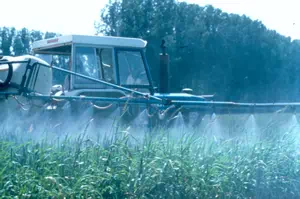Overview
Relevant Activities
Role of Local Governments
U.S. EPA Resources
Other Resources
States
Associations for Local Officials
Over the last several decades, pesticide use has increased dramatically. As of 1991, Americans were using approximately one billion pounds of pesticides a year, twice what was used in 1964.
Chemical pesticides have been used in the United States since the 1950's. When effectively applied, pesticides can kill and control pests including insects, fungi, bacteria and rodents. On the negative side, pesticides have harmful side effects. Many pesticides are known or suspected to be toxic to humans. They can cause neurologic damage, delayed development, cancer, reproductive dysfunction, and possibly impairment of the immune and endocrine systems. Concern about these effects was first expressed in the early 1960's and now has become widespread as knowledge has grown of the toxicity of pesticides.
EPA and the states (usually that state's agriculture department) register or license pesticides for use in the United States. EPA receives its authority to register pesticides under the Federal Insecticide, Fungicide and Rodenticide Act (FIFRA). Additionally, under the Federal Food, Drug and Cosmetic Act (FFDCA), EPA establishes tolerances (maximum legally permissible levels) for pesticide residues on food.
FIFRA provides for federal regulation of pesticide distribution, sale, and use. All pesticides distributed or sold in the United States must be registered by EPA. Before EPA may register a pesticide under FIFRA, the applicant must show, among other things, that using the pesticide according to specifications "will not generally cause unreasonable adverse effects on the environment."
EPA registers pesticides and their use on specific pests and under specific circumstances. For example, "Pesticide A," registered for use on apples, may not be used legally on grapes, or an insecticide registered for "outdoor use" may not legally be used inside a building. In some circumstances, use of a registered pesticide may be restricted to pesticide applicators with special training.
Individuals applying pesticides must do so in a manner not only consistent with federal laws, but also consistent with state laws and regulations, which differ from state to state. The agency with primary responsibility for regulating pesticide use differs in each state.
In the process of eliminating pests, facilities using pesticides risk exposing workers and visitors to toxic chemicals through the inhalation, ingestion, and absorption of pesticide residues. In addition, pesticides and herbicides can contaminate local water resources. When using pesticides local governments must comply with federal and state rules governing their use.
Most states have preempted local governments from regulating pesticides. Seven states, Alaska, Hawaii, Maine, Maryland, Nevada, Utah, and Vermont, do not preempt local governments from regulating pesticides. Local governments in Indiana, Louisiana, Michigan, New Jersey, and Washington may petition the relevant state agency for permission to regulate pesticides.
U.S. Environmental Protection Agency Resources
- U.S. EPA Pesticide Home Page. EPA's pesticide starting point.
- Pesticides Healthcare Environmental Resource Center. Provides detailed information on properties, risks, compliance requirements, alternatives, and disposal requirements for the healthcare sector.
- EPA Pesticide Chemical Search. Allows the user to search EPA's website for information on specific pesticides using the chemical name or Chemical Abstracts Service number assigned by the American Chemical Society.
- National Pesticide Information Center. Provides information about pesticides and pesticide-related topics to enable people to make informed decisions about pesticides and their use.
- National Pesticide Information Center Fact Sheets. Answer questions commonly asked by the public about pesticides and their active ingredients.
- State Pesticide Regulatory Agencies. Provides links to phone numbers, addresses, and web sites for the primary pesticide regulatory agency in each state and US territory.
Associations for Local Officials
- The American Association of Pesticide Safety Educators. An association of educators providing science-based pesticide safety education programs through government agencies and the land-grant university Cooperative Extension Services.



